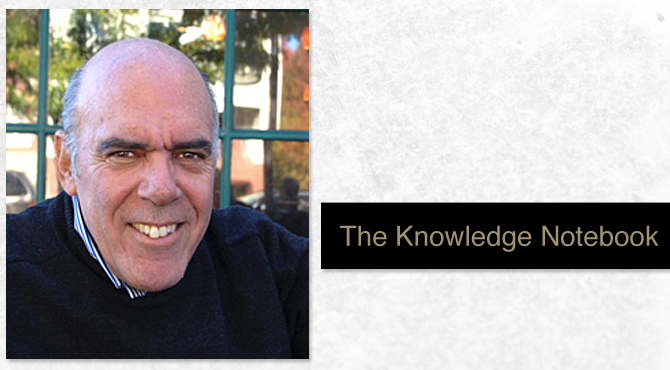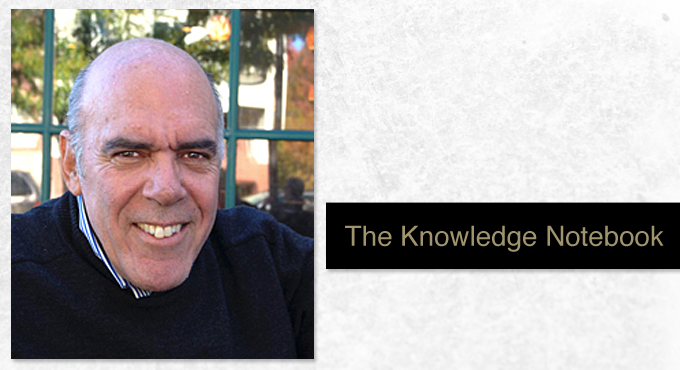
By Laurence Prusak
Who was the last person who knew everything? That’s right, there was a time when this was a legitimate question for pundits in Europe and the early American republic.  Ben Franklin was one contender for the title. Other well-known candidates put forward by people who think about this kind of thing include Francis Bacon, Erasmus, Thomas Aquinas, Voltaire … well, you get the idea.
Ben Franklin was one contender for the title. Other well-known candidates put forward by people who think about this kind of thing include Francis Bacon, Erasmus, Thomas Aquinas, Voltaire … well, you get the idea.
But if we ask whether there is anyone alive today who knows everything, the absurdity of the question quickly becomes apparent. How could a single individual possibly master everything about even one subject, let alone everything about everything?
I have a friend who received a PhD in organic chemistry thirty-five years ago. At his oral exam he was expected to have a pretty good mastery of the whole subject, or at least a nodding acquaintance with major issues and experiments across the field. He recently told me that such an attempt today would be the height of folly. Organic chemistry—like so many other disciplines—has grown so large, with so many new players, institutions, countries, and universities involved in so many areas of research, that any one person, no matter how smart and hardworking, can only master an ever-decreasing percentage of the total knowledge in the field.
The burden of the sheer quantity of knowledge in any field is the focus of an interesting paper by Benjamin Jones of Northwestern University. Though it is written in “economese,” it is worth the effort to read because it takes a very interesting position on just how difficult it is for individuals to know enough to do innovative knowledge work, especially since to innovate usually means to know (and build on) what is already known about a subject.
Just think for a moment about how many Chinese and Indian scientists today are doing research in organic chemistry that weren’t doing it twenty years ago. Or—with the advent of the web—how much research from those and even more remote places is now available easily and cheaply. Who could read all of it even if there were no language issues to overcome? And if you just choose to ignore it, how do you know you aren’t wasting your time replicating work already done in Kuala Lumpur or Lima or Delhi?
The ability to collaborate with a team—sometimes a large team—and understanding how to work with and within a new “division of knowledge” will be more and more critical as we move forward into an age of an ever-increasing burden of knowledge.
The only possible way to avoid this pitfall is to work in large teams where the burden of knowledge can be more easily carried by a group. This is exactly what is happening, according to research Jones and others have carried out. More and more patents and scientific and technical papers are being written by ever-larger groups of researchers, each of them mastering enough of the content in a field so that their aggregate knowledge covers most of the relevant ground and reduces the possibility that their output will reproduce work already done by someone else, wasting huge amounts of time, energy, and money.
This phenomenon is not limited to the pure sciences and technology studies. Research on organizational and management issues—a newer subject of formal studies than most sciences—is approaching the same epistemic limits with the same results. More and more of this work is also being done collaboratively.
Some of the implications of this phenomenon are still slow to seep into schools or even into our general culture. The idea of heroic, individual innovators working alone and with intense focus is a very hard image to abandon. And we wouldn’t want to let it go completely. Within the context of group efforts, talented and knowledgeable individuals still come up with important new ideas. And our individual contributions to our colleagues and teams still depend on our working hard to master what knowledge we can and thinking hard and creatively about it. But no one can fully master a subject anymore, and that makes all the difference in how we approach problems and what skills and behaviors we need to carry out this new way of working well. The ability to collaborate with a team—sometimes a large team—and understanding how to work with and within a new “division of knowledge” will be more and more critical as we move forward into an age of an ever-increasing burden of knowledge.
Write to the Author
- Contact Laurence Prusak
More Articles by Laurence Prusak
- The Knowledge Notebook-The Meaning of Meaning (ASK 42)
- The Knowledge Notebook-The Limits of Knowledge (ASK 41)
- The Knowledge Notebook-What’s Right About Being Wrong (ASK 40)
- The Knowledge Notebook-Believing in Science and Progress (ASK 39)
- The Knowledge Notebook-On Not Going It Alone: No Organization Is an Island (ASK 38)
- + View More Articles








